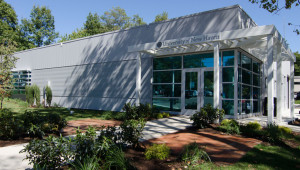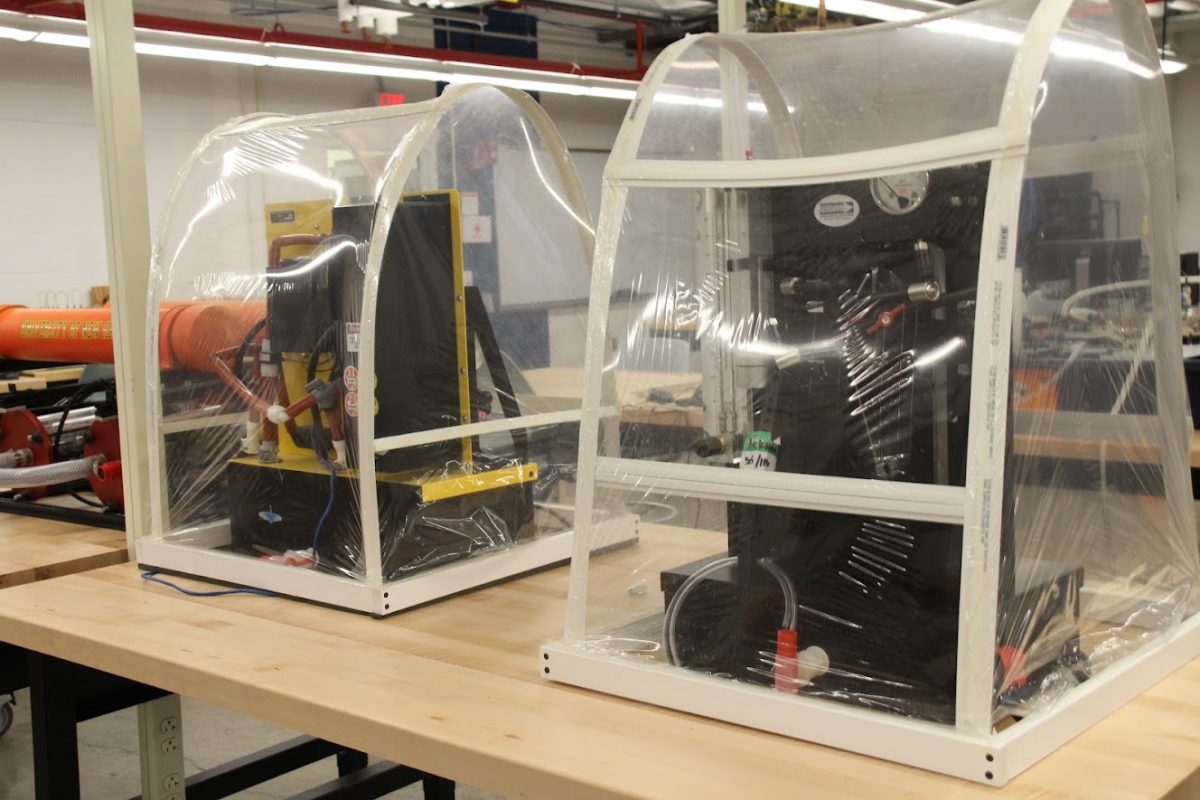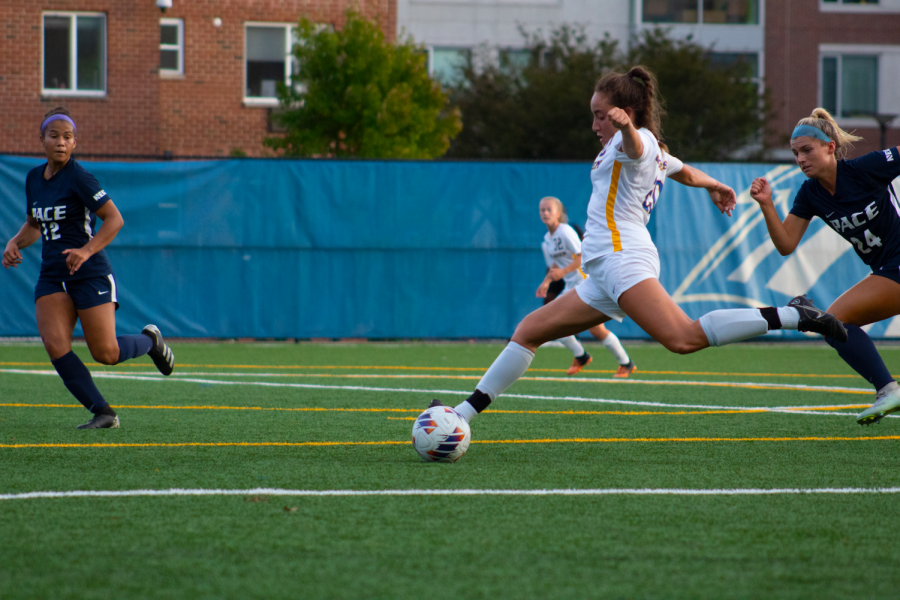When classmates and friends approached freshman Brianna Stefano with concerns about the new MathZone program, the newly-elected USGA Senator knew she had to act.

“I have to represent the student body,” she said. “When they come to me with these issues, I have to speak about them. It’s my obligation.”
In response to dozens of students, Stefano started a petition on Change.org to raise awareness about the issues facing freshmen in MathZone. It has reached almost 200 signatures, 100 of which occurred within the first 24 hours of its creation. Each time a person signs the online petition, an email is sent to President Kaplan.
“They’ve got to see something is wrong here,” Stefano said.
Stefano has heard nothing but complaints about MathZone, a computer-based class which was introduced to incoming freshmen this year. It is designed to be a non-traditional approach to mathematics that allows students to learn at their own pace.
A growing number of low or failing math grades at UNH prompted the math department to introduce this innovative program for students.
Students are usually “pushed along” by their teachers when it comes to math, Department Chair of Mathematics, Joseph Kolibal, said. “In self-paced learning, each student does math at the rate they can absorb it.”
Now, Kolibal added, students can control the speed at which they learn the material.
“The big factor to us was how to get students who are a little bit behind to catch up,” Kolibal said.
Students are placed into their respective math clases depending on placement exams taken when registering for their first semester classes. They read assigned chapters, and complete the homework and tests, all while using the new state-of-the-art Math Learning Center at North Hall, directly behind Echlin Hall.
Once a student completes all chapters related to a specific course and receives a passing grade, they can move along to the next math course. According Kolibal, some freshmen are on their way to complete two math classes in a single semester. Students can also choose to take a “Challenge Exam” to advance to a higher level of math if they believe they are ready.
MathZone bypasses the typical classroom setting, opting for an individualized learning experience.
Instead of having a physical textbook, students read and learn the material online. Also, instead of having a single teacher lead the lesson, students review the chapters and may ask for assistance from instructors or tutors in theMathZone when needed.
Unlike most classes which have a designated time period, students enrolled in the program must complete at least 2.5 hours in the MathZone each week at times of their choice, in addition to outside studying. Students can also work from home to complete homework.
Despite this seemingly straightforward setup, however, the changes that the College of Arts and Sciences hoped would lead to more students excelling in math have left many freshmen actively calling for MathZone’s removal.
Self-Paced Learning
In theory, freshman Leah Gioiella said, MathZone sounds very nice.
“You can go at your own pace, but in actuality, it’s not good at all. You have to take time out of your day to go and the professors there don’t really help. They don’t really lead you into the right direction.”
Gioiella, who has ADD, said learning math on a computer is her worst nightmare. “I literally have to sit there and teach myself. It’s just a terrible experience.”
“Math isn’t something that can be taught on a computer,” said freshman Irene Sogotis, who is currently in fundamental math. “You need interaction, you need to be able to ask questions.”
“I know no one who has anything positive to say about MathZone,” freshman Tim Haggerty said. “Whenever I go, I imediately forget what I just did. I don’t feel like I learned a single thing.”
Haggerty also feels MathZone is catered to the wrong students, stating that those placed in the lowest levels of math need extra help, not to be responsible for learning it themselves.
Sogotis expressed similar views on this issue. “They place the lower level math students in MathZone, which is self taught, instead of placing Calc 1 and Calc 2 students who clearly know what they’re doing.”
According to Stefano, students are continuously struggling to keep up with MathZone even though it is self-paced.
“There are certain students who need to step it up and try harder and actually go…but I know people who are working their butts off and they’re still getting C’s,” she said.
One friend, Stefano added, is placed in 1103 math, which is not for credit, and cannot get through it fast enough to reach the next level because it is self-paced, even though she is spending five hours or more in MathZone a week.
“There’s no balance between how much time you’re supposed to spend there and how much you can actually get done,” she said. “You can’t rush learning.especially with no teacher involved and the fact that it’s all self-motivated.”
The students aren’t the only ones disappointed with the new program. Parents of the class of 2017 have expressed their displeasure with the MathZone on their Facebook page; some have even signed Stefano’s petition.
“I’m paying for a computer to teach my daughter,” one parent’s comment read.
Grading
Students’ motivation to attend MathZone fell even further a few weeks ago, when midterm grades were released. It was announced that about 75 percent of those enrolled in MathZone were failing as of midterms.
Sogotis was part of that 75 percent.
Like many students who attend UNH, Sogotis receives a scholarship for her studies. So far, she has only taken two tests in MathZone and passed both with at least a B+. However, because the grading system compared her individual progress to the course as a whole, Sogotis received her midterm grade of an F.
“If you don’t get a 3.0 or 3.2, depending on the scholarship, you lose your scholarships,” she said. “The fact that MathZone is putting that in jeopardy not only angers me but also my parents as well. They’re the ones paying for me to come here.”
The midterm grades took many freshmen by surprise, something Jose Garcia-Leon, Associate Dean of the College of Arts and Sciences, said was not intended.
“The [MathZone instructors] weren’t sure what to do because there is no midterm in the MathZone. On the other hand, they wanted to provide some sort of feedback to students who were behind, so students could know how they were doing,” Garcia-Leon said. “The first report was not very accurate.”
He added that the midterm grade will be used as more of a reference point and does not count toward the final grade in the course.
Dean of the College of Arts and Sciences, Lourdes Alvarez, also realized the freshmen’s midterm grades were not an accurate depiction of how a student was actually performing.
“That was not the best way to tell students that they weren’t at the point they should have been in the semester,” she said. “It was a poor choice.”
In the future, Alvarez suggested using a bar graph to monitor a student’s progress rather than a letter grade. Because MathZone is a self-paced course, no one is going to get an F in the end, she added.
The department has also extended the deadline to complete MathZone to March 15 because early glitches with the new system prevented some students from logging in. MathZone will also be opened over winter break, and people can also work from home.
Feedback
Addressing students’ issues about MathZone is also something Stefano thinks the university neglected to do early on.
When Stefano brought up the negative student feedback on MathZone to President Kaplan at a USGA meeting, “he gave me the run around. He’s like ‘no, it’s actually working, and we’re seeing really good positive results.’ And then a week later we get these emails about how everyone is failing,” she said.
Some students have had such bad experiences with MathZone that they feel too discouraged to go back on a regular basis.
Freshman Tom D’Ademo said the second time he went into MathZone, a tutor asked him which chapter he was on.
“They were very judgmental on me. I told them I was on the first chapter and they were like, ‘Oh…’” he said. “They just had a big attitude about it, kind of like, ‘you should be smarter.’”
Changes
The university is now taking steps to ensure current and future students in the MathZone are getting the appropriate attention and assistance they need with the program. One major problem Garcia-Leon identified was clarity.
“Every new student had a MathZone orientation the day of convocation…but maybe it was not clear enough. The talk they got was a little long, they got too much information all at once,” Garcia-Leon said.
Students coming into the MathZone for the first time will now be assigned a math tutor for the semester, similar to an orientation leader, who will be there to work with the student should any assistance be desired.
Additionally, the department is holding MathZone lectures for sections of chapters so students can go over specific parts of the material in somewhat of a classroom setting.
Garcia-Leon is now acting as Interim MathZone Coordinator, replacing the former coordinator, Adam Bigos, a mathematics faculty member.
This was done to bring the program more directly under the college itself, and to develop better ways of communication between the students, administration and faculty.
In the last two weeks, Alvarez said they have instituted a robust training for the tutors and faculty so they understand the ways in which they can help break down some of the math apprehension that students have, as well as offer a more welcoming atmosphere.
She said this type of one-on-one mentoring is the key to student centricness in the program.
“I know in the first few weeks we weren’t living up that ideal, so now it’s our job to regain the students’ trust, engage them, and to listen to their concerns and get them going,” she said.
To learn more about MathZone, visit www.newhaven.edu/mathzone, or to view the student petition, visit www.change.org/petitions/adam-bigos-director-of-mathzone-eliminate-mathzone.
















